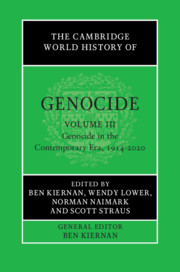Book contents
- The Cambridge World History of Genocide
- The Cambridge World History of Genocide
- The Cambridge World History of Genocide
- Copyright page
- Contents
- Figures
- Tables
- Maps
- Contributors to Volume III
- Introduction to Volume III
- Part I Racism, Total War, Imperial Collapse and Revolution
- Part II World War Two
- 9 From Persecution to Genocide
- 10 Systematic and Ad Hoc Persecution and Mass Murder in the Holocaust
- 11 Jewish Life and Death under Nazi Rule across Europe and around the Globe
- 12 The Nazi Camps and Killing Centres
- 13 State Violence during World War Two
- 14 The Genocide of the Romani People in Europe
- 15 The Nazis and the Slavs
- 16 The Nanjing Massacre
- Part III The Nation-State System during the Cold War
- Part IV Globalisation and Genocide since the Cold War
- Index
15 - The Nazis and the Slavs
Poles and Soviet Prisoners of War
from Part II - World War Two
Published online by Cambridge University Press: 23 June 2023
- The Cambridge World History of Genocide
- The Cambridge World History of Genocide
- The Cambridge World History of Genocide
- Copyright page
- Contents
- Figures
- Tables
- Maps
- Contributors to Volume III
- Introduction to Volume III
- Part I Racism, Total War, Imperial Collapse and Revolution
- Part II World War Two
- 9 From Persecution to Genocide
- 10 Systematic and Ad Hoc Persecution and Mass Murder in the Holocaust
- 11 Jewish Life and Death under Nazi Rule across Europe and around the Globe
- 12 The Nazi Camps and Killing Centres
- 13 State Violence during World War Two
- 14 The Genocide of the Romani People in Europe
- 15 The Nazis and the Slavs
- 16 The Nanjing Massacre
- Part III The Nation-State System during the Cold War
- Part IV Globalisation and Genocide since the Cold War
- Index
Summary
Adolf Hitler had a dismissive view of the Slavs, inherited in part from the late nineteenth-century German nationalist proponents of the Kulturkampf (culture struggle) and the Drang nach Osten (urge to the east). His ideas also derived from his personal experience with the Vienna of his youth; he recalled ‘the embodiment of racial defilement’ and the ‘race conglomerate’ with its ‘alien mix of nationalities’, that he felt destroyed the positive characteristics of Germandom. During and after World War One, his views conformed to the blended ideology of antisemitism, anti-Slavism and colonialism that characterised much of German right-wing thinking about the east.
- Type
- Chapter
- Information
- The Cambridge World History of Genocide , pp. 358 - 378Publisher: Cambridge University PressPrint publication year: 2023

